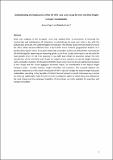| dc.contributor.author | Vega, Amaya | |
| dc.contributor.author | Evers, Natasha | |
| dc.date.accessioned | 2016-06-23T07:43:29Z | |
| dc.date.issued | 2016-04-13 | |
| dc.identifier.citation | Vega, Amaya and Evers, Natasha (2016) 'Implications of the UK HGV road user charge for Irish export freight transport stakeholders A qualitative study'. Case Studies on Transport Policy. doi: http://dx.doi.org/10.1016/j.cstp.2016.04.001 | en_IE |
| dc.identifier.issn | 2213-624X | |
| dc.identifier.uri | http://hdl.handle.net/10379/5896 | |
| dc.description.abstract | Road user charging in the European Union has evolved from a mechanism of financing the construction and maintenance of motorways to internalising the road user costs in line with the polluter pays principle. The United Kingdom introduced a HGV (Heavy Goods Vehicles) Road User Levy Act, 2013, which became effective from 1 April 2014. Given Ireland’s geographical location as a peripheral European nation, it has been historically dependent on the use of the British road network (UK land bridge) for exporting and importing goods to and from Europe. Irish exports are set to be the main growth driver for the Irish economy in real GDP and critical for economic revival. The UK's introduction of the new HGV road charge has raised serious concerns across the freight transport sector and policy-makers in the Republic of Ireland. Such concerns relate to who will be most exposed to the charge and the future aggregate economic impact on stakeholders of the export freight transport sector—notably, hauliers, freight forwarders and exporters. This research explores the potential implications of the newly introduced UK HGV road user charge for export freight transport stakeholders operating in the Republic of Ireland. Semi-structured, in-depth interviews were carried out with key stakeholders with the aim of understanding the extent to which these are affected by the road charge and the perceived feasibility of alternatives currently available for exporters and transport providers. | en_IE |
| dc.description.sponsorship | This research is funded through the Beaufort Marine Research Award, which is carried out under the Sea Change Strategy and the Strategy for Science Technology and Innovation (2006–2013), with the support of the Marine Institute, funded under the Marine Research Sub-Programme of the National Development Plan 2007–2013. | en_IE |
| dc.format | application/pdf | en_IE |
| dc.language.iso | en | en_IE |
| dc.publisher | Elsevier | en_IE |
| dc.relation.ispartof | Case Studies on Transport Policy | en |
| dc.rights | Attribution-NonCommercial-NoDerivs 3.0 Ireland | |
| dc.rights.uri | https://creativecommons.org/licenses/by-nc-nd/3.0/ie/ | |
| dc.subject | Business | en_IE |
| dc.subject | Economics | en_IE |
| dc.subject | Heavy good vehicles | en_IE |
| dc.subject | Road user charging | en_IE |
| dc.subject | Transport policy | en_IE |
| dc.title | Implications of the UK HGV road user charge for Irish export freight transport stakeholders. A qualitative study | en_IE |
| dc.type | Article | en_IE |
| dc.date.updated | 2016-06-20T11:24:34Z | |
| dc.identifier.doi | 10.1016/j.cstp.2016.04.001 | |
| dc.local.publishedsource | http:/dx.doi.org/10.1016/j.cstp.2016.04.001 | en_IE |
| dc.description.peer-reviewed | peer-reviewed | |
| dc.contributor.funder | |~| | |
| dc.description.embargo | 2017-10-13 | |
| dc.internal.rssid | 10997351 | |
| dc.local.contact | Amaya Vega, J.E. Cairnes School Of, Business & Economics, Room 340, Nui Galway. 5679 Email: amaya.vega@nuigalway.ie | |
| dc.local.copyrightchecked | Yes | |
| dc.local.version | PUBLISHED | |
| nui.item.downloads | 635 | |


